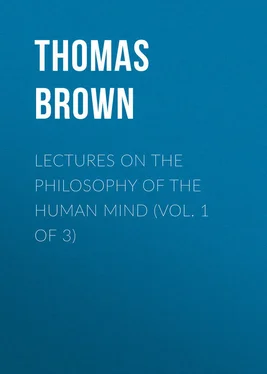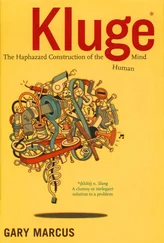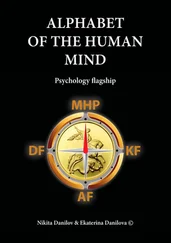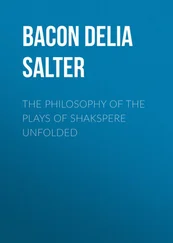Thomas Brown - Lectures on the Philosophy of the Human Mind (Vol. 1 of 3)
Здесь есть возможность читать онлайн «Thomas Brown - Lectures on the Philosophy of the Human Mind (Vol. 1 of 3)» — ознакомительный отрывок электронной книги совершенно бесплатно, а после прочтения отрывка купить полную версию. В некоторых случаях можно слушать аудио, скачать через торрент в формате fb2 и присутствует краткое содержание. Жанр: foreign_antique, foreign_prose, на английском языке. Описание произведения, (предисловие) а так же отзывы посетителей доступны на портале библиотеки ЛибКат.
- Название:Lectures on the Philosophy of the Human Mind (Vol. 1 of 3)
- Автор:
- Жанр:
- Год:неизвестен
- ISBN:нет данных
- Рейтинг книги:5 / 5. Голосов: 1
-
Избранное:Добавить в избранное
- Отзывы:
-
Ваша оценка:
- 100
- 1
- 2
- 3
- 4
- 5
Lectures on the Philosophy of the Human Mind (Vol. 1 of 3): краткое содержание, описание и аннотация
Предлагаем к чтению аннотацию, описание, краткое содержание или предисловие (зависит от того, что написал сам автор книги «Lectures on the Philosophy of the Human Mind (Vol. 1 of 3)»). Если вы не нашли необходимую информацию о книге — напишите в комментариях, мы постараемся отыскать её.
Lectures on the Philosophy of the Human Mind (Vol. 1 of 3) — читать онлайн ознакомительный отрывок
Ниже представлен текст книги, разбитый по страницам. Система сохранения места последней прочитанной страницы, позволяет с удобством читать онлайн бесплатно книгу «Lectures on the Philosophy of the Human Mind (Vol. 1 of 3)», без необходимости каждый раз заново искать на чём Вы остановились. Поставьте закладку, и сможете в любой момент перейти на страницу, на которой закончили чтение.
Интервал:
Закладка:
The nature of the process, by which this moral benefit arises from the mere contemplation of moral objects, frequently repeated, is far from obscure, though it depends on a cause to which you may perhaps as yet have paid little attention, but which, in an after part of the course, I shall have an opportunity of illustrating at length, – the influence of the associating principle in the mind, – of that principle, by which ideas and other feelings, that have often co-existed, acquire, forever after, an almost indissoluble union. It is not merely, therefore, by having traced, more accurately than others, the consequences of vice and virtue, as affecting the general character, that the lover of moral science strengthens his admiration of virtue, and his abhorrence of vice. But, by the frequent consideration of virtue, together with the happiness which it affords, and of vice, together with its consequent misery, the notions of these become so permanently, and so deeply associated, that future virtue appears almost like happiness about to be enjoyed, and future vice like approaching misery. The dread of misery, and the love of happiness, which are essential principles of our very physical existence, are thus transformed into principles of moral conduct , that operate, before reflection, with the rapidity, and almost with the energy of instincts, – and that, after reflection, add to our virtuous resolutions a force and stability, which, as results of mere reasoning, they could not possess.
It is, besides, no small advantage of the abstract consideration of virtue, as opposed to the miseries of vice, that, in considering these philosophically, we regard them as stripped of every thing that can blind or seduce us; and we behold them, therefore, truly as they are. It is not in the madness of intemperate enjoyment, that we see drunkenness in the goblet, and disease in the feast. Under the actual seduction of a passion, we see dimly, if we see at all, any of the evils to which it leads; and if the feelings, of which we are then conscious, were those which were forever after to be associated with the remembrance of the passion, it would appear to us an object, not of disgust or abhorrence, but of delight and choice, and almost of a sort of moral approbation. It is of importance, then, that we should consider the passion, at other moments than these, that the images associated with it may be not of that brief and illusive pleasure, which stupifies its unfortunate victim, but of its true inherent character, of deformity, and of the contempt and hatred which it excites in others. Such is the advantage of the point of view, in which it is seen by the moral inquirer , to whom it presents itself, not under its momentary character of pleasure, but under its lasting character of pain and disgust. By habituating himself to consider the remote , as well as the immediate results of all the affections and passions, he learns to regard virtue, not merely as good in itself, at the moment in which it is called into exercise, but as an inexhaustible source of good which is continually increasing; and vice not merely as a temporary evil in itself, but as a source of permanent and yet deeper misery and degradation. Every generous principle, which nature has given him, is thus continually deriving new strength, from the very contemplation of the good which it affords; and if, in the frailty of mortality, he should still be subject to the occasional influence of those very passions, which, in cooler moments, he detests, he yet does not fall, thoroughly and hopelessly. There are lingering associations of moral beauty and happiness in his mind, which may save him still, – associations that must render it, in some degree at least, more difficult for him than for others, to yield to seductions, of which he has long known the vanity, and which perhaps even may, in some happier hour, lead him back to that virtue, of which he has never wholly forgotten the charms.
The charms of virtue, indeed, it is scarcely possible, for him who has felt them, wholly to forget. There may be eyes that can look unmoved on the external beauty which once delighted them. But who is there that has ever been alive to its better influence, who can think of moral loveliness without a feeling of more than admiration, – without a conscious enjoyment, in the possession of what is so truly admirable, or a sigh at having lost the privilege of dwelling on it with delight, and at being obliged to shrink from the very thought of what it once appeared?
“For what can strive
With virtue? which of nature's regions vast
Can in so many forms produce to sight
Such powerful beauty? – Beauty, which the eye
Of hatred cannot look upon secure;
Which Envy's self contemplates, and is turn'd
Ere long to tenderness, to infant smiles,
Or tears of humblest love. Is ought so fair,
In all the dewy landscapes of the Spring,
The Summer's noontide groves, the purple eve
At harvest-home, or in the frosty moon
Glittering on some smooth sea, is aught so fair
As virtuous friendship? As the honour'd roof,
Whither, from highest heaven, immortal love,
His torch etherial, and his golden bow,
Propitious brings, and there a temple holds,
To whose unspotted service gladly vow'd,
The social bond of parent, brother, child,
With smiles, and sweet discourse, and gentle deeds,
Adore his power? What gift of richest clime
E'er drew such eager eyes, or prompted such
Deep wishes, as the zeal, that snatcheth back
From Slander's poisonous tooth a foe's renown,
Or crosseth Danger in his lion-walk,
A rival's life to rescue?”
The study of moral science, then, we have seen, has a direct tendency to strengthen our attachment to the virtues which we habitually contemplate. Another most important advantage derived from it, relates to us in our higher character of beings capable of religion , increasing our devotion and gratitude to the Divinity, by the clearest manifestation which it gives us of his provident goodness in the constitution and government of the moral world.
The external universe , indeed, though our study were confined to the laws which regulate its phenomena, would afford, in itself, abundant proof of the power and wisdom by which it was created. But power and wisdom alone excite admiration only, not love; which, though it may be feigned in the homage that is universally paid to power, is yet, as an offering of the heart, paid to it only when it is combined with benevolence. It is the splendid benevolence, therefore, of the Supreme Being, which is the object of our grateful adoration; and, to discover this benevolence, we must look to creatures that have not existence merely , like inanimate things, but a capacity of enjoyment, and means of enjoyment. It is in man, – or in beings capable of knowledge and happiness, like man, – that we find the solution of the wonders of the creation; which would otherwise, with all its regularity and beauty, be but a solitary waste, like the barren magnificence of rocks and deserts. God, says Epictetus, has introduced man into the world, to be the spectator of his works, and of their divine Author; and not to be the spectator only, but to be the announcer and interpreter of the wonders which he sees and adores. Ὁ Θεὸς – τὸν ἄνθρωπον θεατὴν εἰσήγαγεν αὐτοῦ τε καὶ τῶν ἔργων τῶν αὐτοῦ· καὶ οὖ μόνον θεατὴν ἀλλὰ καὶ ἐξηγητὴν αὐτῶν. 15 15 Dissertat. ab Arrian, collect, lib. i. c. 6. – p. 35. Edit. Upton.
“Hæc qui contemplatur,” says another ancient Stoic, with a little of the bold extravagance of his school, – “Hæc qui contemplatur, quid Deo præstat? Ne tanta ejus opera sine teste sint.” – “Curiosum nobis natura ingenium dedit; et artis sibi ac pulchritudinis suae conscia, spectatores nos tantis rerum spectaculis genuit, perditura fructum sui, si tam magna, tam clara, tarn subtiliter ducta, tam nitida, et non uno genere formosa solitudini ostenderet.” 16 16 Seneca de otio Sapent. c. 32.
Интервал:
Закладка:
Похожие книги на «Lectures on the Philosophy of the Human Mind (Vol. 1 of 3)»
Представляем Вашему вниманию похожие книги на «Lectures on the Philosophy of the Human Mind (Vol. 1 of 3)» списком для выбора. Мы отобрали схожую по названию и смыслу литературу в надежде предоставить читателям больше вариантов отыскать новые, интересные, ещё непрочитанные произведения.
Обсуждение, отзывы о книге «Lectures on the Philosophy of the Human Mind (Vol. 1 of 3)» и просто собственные мнения читателей. Оставьте ваши комментарии, напишите, что Вы думаете о произведении, его смысле или главных героях. Укажите что конкретно понравилось, а что нет, и почему Вы так считаете.












![Anne Blunt - A Pilgrimage to Nejd, the Cradle of the Arab Race. Vol. 1 [of 2]](/books/749489/anne-blunt-a-pilgrimage-to-nejd-the-cradle-of-the-thumb.webp)